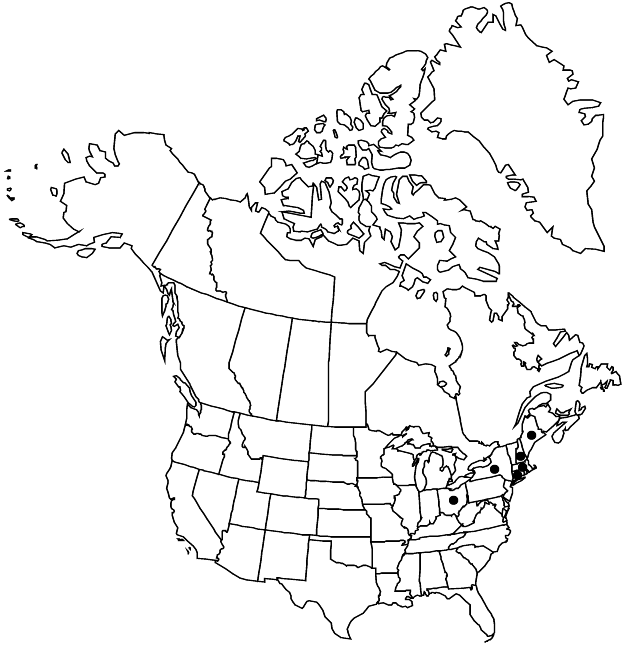Difference between revisions of "Silene viscaria subsp. viscaria"
FNA>Volume Importer |
imported>Volume Importer |
||
| (4 intermediate revisions by one other user not shown) | |||
| Line 1: | Line 1: | ||
{{Treatment/ID | {{Treatment/ID | ||
|accepted_name=Silene viscaria subsp. viscaria | |accepted_name=Silene viscaria subsp. viscaria | ||
| − | |accepted_authority= | + | |accepted_authority= |
|publications= | |publications= | ||
|basionyms= | |basionyms= | ||
| Line 19: | Line 19: | ||
|elevation=0-500 m | |elevation=0-500 m | ||
|distribution=Conn.;Maine;Mass.;N.H.;N.Y.;Ohio;Europe. | |distribution=Conn.;Maine;Mass.;N.H.;N.Y.;Ohio;Europe. | ||
| + | |introduced=true | ||
|discussion=<p>Subspecies viscaria is an attractive garden plant similar to <i>S. suecica</i> but somewhat larger and sturdier with viscid pedicels. It occasionally escapes but does not persist.</p> | |discussion=<p>Subspecies viscaria is an attractive garden plant similar to <i>S. suecica</i> but somewhat larger and sturdier with viscid pedicels. It occasionally escapes but does not persist.</p> | ||
|tables= | |tables= | ||
| Line 28: | Line 29: | ||
-->{{#Taxon: | -->{{#Taxon: | ||
name=Silene viscaria subsp. viscaria | name=Silene viscaria subsp. viscaria | ||
| − | + | |authority= | |
| − | |authority= | ||
|rank=subspecies | |rank=subspecies | ||
|parent rank=species | |parent rank=species | ||
| Line 44: | Line 44: | ||
|publication year= | |publication year= | ||
|special status= | |special status= | ||
| − | |source xml=https:// | + | |source xml=https://bitbucket.org/aafc-mbb/fna-data-curation/src/2e0870ddd59836b60bcf96646a41e87ea5a5943a/coarse_grained_fna_xml/V5/V5_435.xml |
|subfamily=Caryophyllaceae subfam. Caryophylloideae | |subfamily=Caryophyllaceae subfam. Caryophylloideae | ||
|genus=Silene | |genus=Silene | ||
Latest revision as of 22:11, 5 November 2020
Plants perennial; taproot stout, branched; caudex compact, multicapitate. Stems erect, simple proximal to inflorescence, 30–90 cm, glabrous, viscid, especially at nodes. Leaves: basal numerous, tufted, petiolate, blade oblanceolate to linear-oblanceolate, 4–15 cm × 2–10 mm (including petiole), apex acute, glabrous, ciliate at base; cauline in 2–4 pairs, connate proximally, sessile. reduced distally, blade linear-lanceolate, 2–10 cm × 2–8 mm, apex acute, glabrous, ciliate at base. Inflorescences paniculate, consisting of short, interrupted cymes, narrow, bracteate, bracteolate; cyme 3–10-flowered, proximal ones pedunculate; peduncle to 3 cm; bracts leaflike, to 3 cm; bracteoles broadly lanceolate, 3–10 mm, margins membranous, apex acuminate. Pedicels shorter than calyx, glabrous but viscid. Flowers 14–22 mm diam.; calyx purple, obscurely veined, narrowly campanulate in flower, 6–10 × 3–4 mm, clavate in fruit, 10–15 × ca. 5 mm, papery, puberulent, lobes ovate, ca. 1.5 cm, margins narrow, membranous, apex obtuse; corolla purple or dark pink (rarely white), ca. 11/2–2 times calyx, clawed, claw equaling calyx, limb spreading, obovate, entire or slightly notched, 5–9 mm, appendages 2, oblong, 3 mm; stamens shortly exserted; stigmas 5, shortly exserted. Capsules ovoid, equaling calyx, opening by 5 teeth; carpophore 3–5 mm. Seeds dark brown, reniform, 0.3–0.5 mm, finely tuberculate. 2n = 24 (Europe).
Phenology: Flowering early summer.
Habitat: Roadsides, waste ground, fields
Elevation: 0-500 m
Distribution

Introduced; Conn., Maine, Mass., N.H., N.Y., Ohio, Europe.
Discussion
Subspecies viscaria is an attractive garden plant similar to S. suecica but somewhat larger and sturdier with viscid pedicels. It occasionally escapes but does not persist.
Selected References
None.